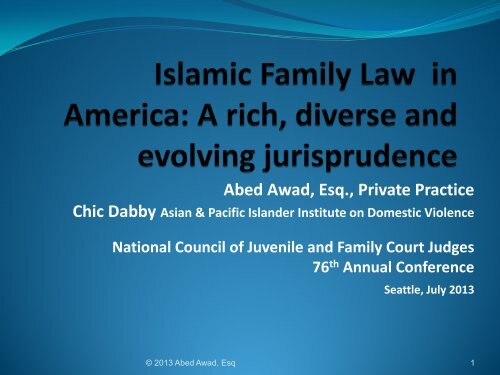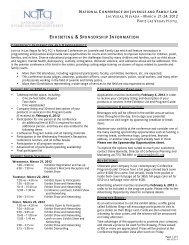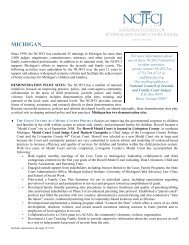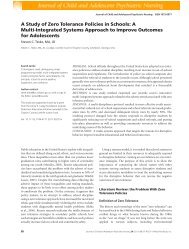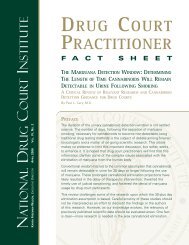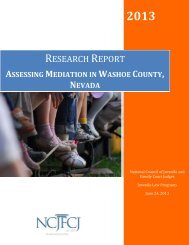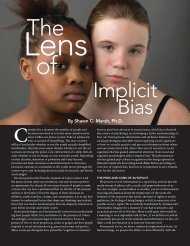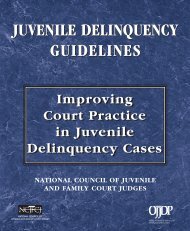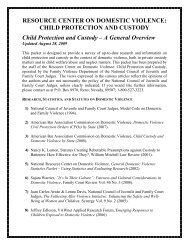Islamic Marriage Contracts - National Council of Juvenile and Family ...
Islamic Marriage Contracts - National Council of Juvenile and Family ...
Islamic Marriage Contracts - National Council of Juvenile and Family ...
- No tags were found...
You also want an ePaper? Increase the reach of your titles
YUMPU automatically turns print PDFs into web optimized ePapers that Google loves.
Abed Awad, Esq., Private PracticeChic Dabby Asian & Pacific Isl<strong>and</strong>er Institute on Domestic Violence<strong>National</strong> <strong>Council</strong> <strong>of</strong> <strong>Juvenile</strong> <strong>and</strong> <strong>Family</strong> Court Judges76 th Annual ConferenceSeattle, July 2013© 2013 Abed Awad, Esq 1
<strong>Islamic</strong> <strong>Marriage</strong>s & DivorcesAbed Awad, Esq.<strong>Islamic</strong> <strong>Marriage</strong> <strong>Contracts</strong>: A Resource Guide forLegal Pr<strong>of</strong>essionals, Advocates, Imams &Communities• Collaborative Project <strong>of</strong>:• Peaceful Families Project• Battered Women’s Justice Project• Asian & Pacific Isl<strong>and</strong>er Institute on Domestic Violence• Author: Maha Alkhateeb© 2013 Abed Awad, Esq 2
Introduction:1. Who are American Muslims?• There are an estimated 3 to 7 million Muslims in the U.S.• Late 1800s – early 1900s: from Middle East origins• 1960s: South Asian, West Asian, Middle East origins• 1990s: Balkans, Middle East, South Asia, SE Asia• Practices <strong>of</strong> American Muslims may reflect <strong>Islamic</strong>teachings to varying degrees <strong>and</strong> are informed by thediverse homes in which they are raised• Not all Muslims are religiously practicing• Muslims, like the majority <strong>of</strong> Americans, choose areligious minister to solemnize their marriages.© 2013 Abed Awad, Esq 3
Intro: 2.Muslim Women’s Rightsin Historical Context• Islam gave women rights not granted in 7 th centuryArabia• These included the right to:• Vote• Own, inherit, manage, bequeath, <strong>and</strong> dispose <strong>of</strong> property• Inherit, women could not be disinherited by will• Legal capacity to contract• Work• Sexual satisfaction• Consent to marriage© 2013 Abed Awad, Esq 4
Intro: 3. Domestic Violence• Prevalence: 31% report domestic violence in theirlifetime• Types <strong>of</strong> violence: emotional (45%), physical (31%),financial (16%), sexual (15%)• Other: spiritual abuse, threats to her reputation,immigration-status related abuse, using children, threatsto harm her family members• Trends include: ab<strong>and</strong>onment, forced marriage,appropriating Mahr, unilateral divorce• Islam recommends multi-step process, with mutualconsultation <strong>and</strong> open discussion to resolve conflict• Islam does not permit men to engage in wife abuse© 2013 Abed Awad, Esq 5
Intro: 4. What is Sharīʿah?• More than “law” in the prescriptive sense• Methodology <strong>and</strong> process <strong>of</strong> ascertaining divinemeaning.• A legal system based on the general principles containedin the Qur’an <strong>and</strong> Sunna.© 2013 Abed Awad, Esq 6
4. Sharīʿah, cont.• Sharīʿah is the moral <strong>and</strong> legal anchor <strong>of</strong> a Muslim's totalexistence.• Everything from the way Muslims marry <strong>and</strong> dissolve theirmarriages, to the way they eat, to how they treat animals<strong>and</strong> protect the environment, to the way they conductcommercial trade, <strong>and</strong> to the way their estate must bedistributed at death, is governed by Sharīʿah. Whether acommercial transaction or a divorce settlement or one'srelationship with parents, the elderly <strong>and</strong> children isgoverned by the same degree <strong>of</strong> honesty, good faith, an eyeto fairness, social responsibility, <strong>and</strong> equity – an ethical lifeseeking to please God.© 2013 Abed Awad, Esq 7
B. MARRIAGE1. <strong>Marriage</strong> in Islam• <strong>Marriage</strong> is defined as a compassionate peacefulrelationship, based on gender equality, requiringcouples to consult each other for joint decision-making.• <strong>Marriage</strong> is a civil contract.• Requires bride <strong>and</strong> groom to reach majority.• Steps are an <strong>of</strong>fer, acceptance, signing the marriagecontract w/2 witnesses, publicizing the marriage• Non-Civil <strong>Marriage</strong> / Religious <strong>Marriage</strong>• When a couple signs an <strong>Islamic</strong> <strong>Marriage</strong> Contract withoutregistering for a civil marriage license.• Rights are best protected w/civil marriage license© 2013 Abed Awad, Esq 8
2. <strong>Marriage</strong> Contract• As a civil contract, the bride has tremendous leeway tonegotiate the terms <strong>of</strong> her marriage contract.• Popular ‘stipulations’ or terms from the bride include:• Finances• Marital residence, domicile, living conditions• Children• In-laws• Equal right to initiate divorce• Right to work, to education• Equal division <strong>of</strong> domestic responsibilities• Monogamy, restriction on polygamy© 2013 Abed Awad, Esq 9
3. Mahr• Mahr: What is it? Is it a dowry?• Mahr is effect <strong>of</strong> the marriage contract <strong>and</strong> isnot a consideration for the contract• Mahr is divided into prompt <strong>and</strong>/or postponed• Mahr is a debt obligation upon the husb<strong>and</strong>enforceable against his assets• Mahr is the property <strong>of</strong> the bride <strong>and</strong> is distinct<strong>and</strong> separate from the wife’s rights toinheritance <strong>and</strong> alimony© 2013 Abed Awad, Esq 10
4. Property Rightsin <strong>Islamic</strong> <strong>Family</strong> Law• <strong>Islamic</strong> law does not recognize the concept <strong>of</strong> maritalassets – each party keep his or her own propertyacquired <strong>and</strong> titled in her or his name• Joint property <strong>and</strong> partnership concepts related tomarriage• <strong>Islamic</strong> law <strong>of</strong> Inheritance: Spouse can’t disinheritspouse.• Women have legal capacity to contract, manage <strong>and</strong>own property.© 2013 Abed Awad, Esq 11
C. DIVORCE1. Three Types <strong>of</strong> Divorce• Three primary ways to dissolve a marriage under <strong>Islamic</strong>law:1. Talaq/Unilateral Divorce2. Tafriq/Judicial Divorce3. Khul/Mutual Divorce or Wife Initiated• Trend: Ab<strong>and</strong>onment Divorce| “Marry-<strong>and</strong>-Dump”• Ab<strong>and</strong>onment occurs (1) overseas (2) in U.S.• Divorce is filed (3) overseas or (4) in U.S.© 2013 Abed Awad, Esq 12
C. Divorce: 2. Consequences <strong>of</strong> Divorce• Mahr: husb<strong>and</strong>’s gift to wife• Waiting Period: generally 3 month ‘cooling down’ period inthe same home but separate quarters. It’s an opportunity toreconcile & confirm wife is not pregnant• Custody• Child support• Alimony© 2013 Abed Awad, Esq 13
C. Divorce: 2. Consequences <strong>of</strong> DivorceCustody |Hadhana• There really is no <strong>Islamic</strong> legal equivalent to custody thatwe underst<strong>and</strong> here in the U.S.• Custody is composed <strong>of</strong> three forms <strong>of</strong> guardianship.1. Guardianship for rearing2. Guardianship over child’s property3. Guardianship over child’s person• Foreign Custody Decrees© 2010 Abed Awad, Esq 14
D. RELEVANCE OF ISLAMIC LAW IN THE U.S.<strong>Islamic</strong> family law is a rich, diverse <strong>and</strong>evolving jurisprudence.• <strong>Islamic</strong> law, customs <strong>and</strong>/or traditions have routinelysurfaced in family related litigation in American courtsaround:© 2013 Abed Awad, Esq 15
Relevance <strong>of</strong> <strong>Islamic</strong> Law, cont.• Is a Muslim marriage contract enforceable underState law?• Is a foreign divorce decree from a Muslimcountry recognized under State law?• When there is a jurisdictional conflict betweenState <strong>and</strong> Muslim country, how to approach it?© 2013 Abed Awad, Esq 16
Relevance <strong>of</strong> <strong>Islamic</strong> Law, cont.• Is a Muslim marriage in America legal?• Is it void or voidable? Consequences <strong>of</strong> void marriage• How about Remarriage?Courts around the country are forced toaddress these <strong>and</strong> many other issuesunique to the Muslim Americancommunities.© 2013 Abed Awad, Esq 17
Relevance <strong>of</strong> <strong>Islamic</strong> Law, cont.Sharīʿah is relevant in American litigation either as:(i) a foreign law; or(ii) as a source <strong>of</strong> information to aid in theinterpretation <strong>of</strong> a contract or dispute (for example, tounderst<strong>and</strong> the expectations <strong>of</strong> the parties in adispute, to clarify an ambiguous term, to correctmistakes, to determine established custom <strong>and</strong> thelike).© 2013 Abed Awad, Esq 18
E. CASE LAW• The cases in the United States involving the Muslimmarriage contract pertain to whether it is a prenuptialagreement or a simple contract.© 2013 Abed Awad, Esq 19
Sharia as extrinsic evidence• simple contract• basic contract elements: <strong>of</strong>fer, acceptance <strong>and</strong>consideration© 2013 Abed Awad, Esq 20
• prenup• in addition to basic contract elements <strong>and</strong> traditionalcontract defenses, the court inquires whether theparties had advice <strong>of</strong> counsel <strong>and</strong> financial disclosuresbefore signing the agreement.© 2013 Abed Awad, Esq 21
Is <strong>Islamic</strong> <strong>Marriage</strong> Contract a PrenuptialAgreement?• Some courts treated it as a prenuptial <strong>and</strong> enforcedMahr• Impact on Wife• Held that the agreement was invalid as it did not complywith the requirements <strong>of</strong> premarital agreements: advice<strong>of</strong> counsel <strong>and</strong> full <strong>and</strong> complete financial disclosureswere absent• Impact on wife <strong>and</strong>/or both parties© 2013 Abed Awad, Esq 22
Is Mahr/<strong>Islamic</strong> <strong>Marriage</strong> Contract a SimpleContract?• In the following cases, the courts construed the Muslimmarriage contract as a prenuptial agreement. Theunique facts <strong>of</strong> each case combined with the state <strong>of</strong>prenuptial jurisprudence in the jurisdiction determinedwhether the mahr was enforceable or not.© 2013 Abed Awad, Esq 23
• Afghani v. Ghafoorian• Akileh v. Elchahal• -- substantial mahr• -- marriage contract is a valid premarital agreement thatdid not violate public policy• -- mahr enforced• --marriage sufficient consideration• --parties agreed to the essential terms <strong>of</strong> the contract© 2013 Abed Awad, Esq 24
• Like in Afghani <strong>and</strong> Akileh, the courts in Ahmed v.Ahmed, <strong>and</strong> In re Altayar <strong>and</strong> Muhyaddin, determinedthat the Muslim marriage contract was a prenuptialagreement but invalid under state law.© 2013 Abed Awad, Esq 25
• Ahmed• Wife wins at trial level but loses on appeal• Appellate Court found that the parties’ valid civilwedding ceremony occurred six months before signingthe mahr agreement, i.e., they were not ‘prospectivespouses'© 2013 Abed Awad, Esq 26
• Similarly, in Altayar, the court described the mahr as aprenuptial agreement but invalid under state law.© 2013 Abed Awad, Esq 27
• a “[p]renuptial agreement is valid only when it is plainlyshown that the transaction was fair”• “the exchange <strong>of</strong> 19 pieces <strong>of</strong> gold for equitableproperty rights under Washington law is not fair . . . .Even if it were a fair agreement, there is no evidencethat he disclosed his assets or that [wife] received anyindependent advice during the three days between theirinitial meeting <strong>and</strong> marriage.”© 2013 Abed Awad, Esq 28
• Similarly, in Zawahiri v. Alwattar, <strong>and</strong> Ahmad v. Ahmad,the court agreed that the Muslim marriage contract wasa prenuptial agreement but held that the agreementwas invalid as it did not comply with the requirements<strong>of</strong> premarital agreements: advice <strong>of</strong> counsel <strong>and</strong> full <strong>and</strong>complete financial disclosures were absent.© 2013 Abed Awad, Esq 29
• In re <strong>Marriage</strong> <strong>of</strong> Dajani,• the mahr allowed the wife to pr<strong>of</strong>it from filing fordivorce to obtain her five thous<strong>and</strong> Jordanian dinarsmahr.© 2013 Abed Awad, Esq 30
• Husb<strong>and</strong> seeking enforcement• Shaban v. Shaban• Unlike most other cases where the wife sought thepayment <strong>of</strong> her mahr, husb<strong>and</strong> asked the court torecognize his Egyptian marriage contract with anominal mahr as a prenuptial agreement to bar thewife from community property <strong>and</strong> alimony.© 2013 Abed Awad, Esq 31
• Court held the contract was too vague <strong>and</strong> indefinite tobe enforced• that their marriage shall be governed by the laws <strong>of</strong>Islam <strong>and</strong> the traditions <strong>of</strong> the prophet alone was“hopelessly uncertain as to its terms <strong>and</strong> conditions” tosatisfy the statute <strong>of</strong> frauds on its own.© 2013 Abed Awad, Esq 32
In the following cases, the courts construed theMuslim marriage contract as a simple contract.• Abdallah v. Sarsour, Aziz v. Aziz, <strong>and</strong> Odattalav. Odatalla, 355 N.J.Super. 305, 810 A.2d 93 (2002), the courts found that the mahragreement satisfied the elements <strong>of</strong> a valid simple contract <strong>and</strong>thus enforced the mahr.• Abdallah• Contract was not void for vagueness• “where an agreement is to pay money <strong>and</strong> no time is specified, it isinterpreted as being an agreement to pay the same on dem<strong>and</strong>;<strong>and</strong> if it is an agreement to do something other than to pay money,it is interpreted as a promise to do it in a reasonable time.”© 2013 Abed Awad, Esq 33
• Aziz• <strong>Islamic</strong> marriage contract conformed to therequirements <strong>of</strong> New York contract law <strong>and</strong> was“enforceable as a contractual obligation,notwithst<strong>and</strong>ing that it was entered into as part <strong>of</strong> areligious ceremony.”© 2013 Abed Awad, Esq 34
• Similarly, in Odatalla, the trial court enforced the dowerprovision holding that applying neutral principles <strong>of</strong> law(i.e. the principles <strong>of</strong> contract law in New Jersey) tothe mahr agreement satisfied all the elements <strong>of</strong> a validcivil contract.© 2013 Abed Awad, Esq 35
• The evidence showed the husb<strong>and</strong>:• freely making an <strong>of</strong>fer to the wife by signingthe mahr agreement• the wife accepting the <strong>of</strong>fer by signing the agreement<strong>and</strong> the husb<strong>and</strong> intentionally binding himself to theagreement by making the payment required bythe mahr© 2013 Abed Awad, Esq 36
• Obaidi v. Qayoum <strong>and</strong> Habibi-Fahnrich v. Fahnrich• marriage contract was construed as a simple contractbut found that the parties did not have a meeting <strong>of</strong> theminds <strong>and</strong> that the contract was entered into underduress <strong>and</strong> overreaching.© 2013 Abed Awad, Esq 37
• Habibi-Fahnrich v. Fahnrich• "SADAQ being a ring <strong>and</strong> half <strong>of</strong> husb<strong>and</strong>'spossessions” was undefined, indefinite <strong>and</strong> not specificto have a meeting <strong>of</strong> the minds to meeting therequirement <strong>of</strong> a valid contract under New York law.© 2013 Abed Awad, Esq 38
• Obaidi• contract written in Farsi• husb<strong>and</strong> did not speak, read or write Farsi• neutral principles <strong>of</strong> contract law governed the interpretation<strong>of</strong> the contract• concluded that there was no meeting <strong>of</strong> the minds becausethe husb<strong>and</strong> was advised <strong>of</strong> the mahr ceremony fifteenminutes before he signed the document <strong>and</strong> he did not read,write or speak Farsi <strong>and</strong> he was pressured to sign theagreement by the families.© 2013 Abed Awad, Esq 39
DIVORCESharīʿah as Foreign law• In the following cases the courts refused to recognizeforeign divorces obtained unilaterally/ex partebyhusb<strong>and</strong>s.• Rahawangi v. Al-Samman• divorce decree obtained via proxy without notice wasnot recognized© 2013 Abed Awad, Esq 40
Divorce, cont.• Tarikonda v. Pinjari• the wife was not afforded the basic rudiments <strong>of</strong> dueprocess, she was not present in court <strong>and</strong> no hearing onthe merits was held.• it would be against public policy to recognize the Indi<strong>and</strong>ivorce because <strong>Islamic</strong> law differs substantially fromMichigan law in regards to property distribution.© 2013 Abed Awad, Esq 41
Divorce, cont.• In the following cases the courts recognized foreigndivorces in which the parties actively participated in theforeign litigation.© 2013 Abed Awad, Esq 42
Divorce, cont.• In S.B. v W.A.• Parties moved to Abu Dhabi for work• While living there for several years, the parties commenceddomestic violence <strong>and</strong> divorce proceedings• The trial court recognized the Abu Dhabi decisions finding that thedivorce decree was obtained after trial <strong>and</strong> two appeals. Therewas no question that the court had jurisdiction over the parties<strong>and</strong> the divorce because the parties resided in Abu Dhabi at thetime. The court found nothing in the divorce decree that wouldviolate New York’s public policy.© 2013 Abed Awad, Esq 43
Divorce, cont.• The court in Aqel v. Aqel recognized a foreigndivorce decree obtained in Jordan.• The husb<strong>and</strong> did not finalize his divorce in Jordanwhen he married American.• His marriage was annulled <strong>and</strong> he return to Jordanto finalize his divorce. After obtaining a revocabledivorce in Jordan, he remarried the American wife.© 2013 Abed Awad, Esq 44
Divorce, cont.• In the following cases the validity <strong>of</strong> the foreign divorceturned on whether the parties were residents in theforeign country.• In Husein v. Husein• Ex parte divorce in Palestine without residency was notentitled to comity© 2013 Abed Awad, Esq 45
• Aleem v. Aleem, Pakistani Embassy in Washington DCdivorce where the parties were Maryl<strong>and</strong> residents for20 years was not entitled to comity.© 2013 Abed Awad, Esq 46
• Sherif v. Sherif• The parties established residence in Egypt at the time <strong>of</strong>the divorce.• During their presence in Egypt, the husb<strong>and</strong> obtained adivorce consistent with Egyptian law.• The trial court recognized the Egyptian divorce as amatter <strong>of</strong> comity <strong>and</strong> dismissed the wife’s spousalsupport action.© 2013 Abed Awad, Esq 47
Important Issues:• Religious divorces (ṭalāq ) taking place in the UnitedStates are not valid.• A divorce in the United States must be a judicial divorce.© 2013 Abed Awad, Esq 48
• However, an American court is likely to recognize areligious divorce obtained from a foreign consulate if thedivorce complied with basic due process <strong>and</strong> wasmutual <strong>and</strong> both parties appeared.© 2013 Abed Awad, Esq 49
• Divorce only terminates or severs the maritalrelationship.• If the divorce did not resolve the financial <strong>and</strong> nonfinancialaspects arising out <strong>of</strong> the marriage –alimony, equitable distribution, child support <strong>and</strong>custody – either spouse is able to commence anaction to determine these open issues as the fewcases above have confirmed.© 2013 Abed Awad, Esq 50
• In religious divorces taking place abroad, the st<strong>and</strong>ardcomity factors must be considered: due process, notice,fairness, opportunity to participate <strong>and</strong> the like.• Furthermore, the residency <strong>and</strong> marital domicile <strong>of</strong> theparties is a major factor courts consider before grantingcomity to a foreign divorce decree.© 2013 Abed Awad, Esq 51
• The norm in today’s global village is that couples or each<strong>of</strong> them have multiple residences.• How should a court deal with cross border divorces,assets in multiple jurisdictions <strong>and</strong> income from morethan one jurisdiction?© 2013 Abed Awad, Esq 52
• Which country has jurisdiction? Does the first filer havean advantage? If the matter is pending in one country,should the other country stay its proceedings pendingan outcome?© 2013 Abed Awad, Esq 53
Religious <strong>Marriage</strong>s <strong>and</strong> <strong>Marriage</strong>Licenses• The following cases examine the different approaches todetermine the validity <strong>of</strong> religious marriage that did notcomply with all <strong>of</strong> the state law formalities.© 2013 Abed Awad, Esq 54
• Yaghoubinejad v. Haghighi the parties marriage is voidfor lack <strong>of</strong> marriage license© 2013 Abed Awad, Esq 55
• Ellehaf v. Tarraf, the parties were married in an <strong>Islamic</strong>ceremony in Michigan without obtaining a marriagelicense.• holding that the parties were never legally marriedbecause they did not obtain a marriage license.© 2013 Abed Awad, Esq 56
• In Mussa v. Palmer-Mussa, religious marriage was validuntil dissolved by judicial authority© 2013 Abed Awad, Esq 57
• Matter <strong>of</strong> Farraj• The law <strong>of</strong> the marital domicile governed validity <strong>of</strong>marriage without license.• <strong>Marriage</strong> that took place in New Jersey would be voidbut under New York law would be voidable. <strong>Marriage</strong>found valid© 2013 Abed Awad, Esq 58
Domestic Religious Divorces• In Mussa <strong>and</strong> Shikoh v. Murff, 257 F.2d 306 (2 nd Cir.1958), the court made clear that religious divorces in theUnited States are not a substitute for civil divorcejudgment.© 2013 Abed Awad, Esq 59
• Muslim marriages are valid <strong>and</strong> recognized in the UnitedStates like any other religious marriage.© 2013 Abed Awad, Esq 60
• The issues raised in the above cases are not the validity<strong>of</strong> religious marriages that take place in the UnitedStates, but rather the validity <strong>of</strong> a religious marriagethat take place in the United States <strong>and</strong> fail to complywith the state regulatory requirements such asobtaining a marriage license before the marriage issolemnized by an authorized religious figure.© 2013 Abed Awad, Esq 61
• The New York voidable approach to resolving marriagevalidity issues is far more equitable than New Jersey’s voidapproach.• recognize relationships that are less formal with or without awriting• New Jersey <strong>and</strong> many other states recognizes a cause <strong>of</strong>action called palimony for financial damages for breaching apromise to support your partner for life in writing <strong>and</strong> somewithout a writing.• Many states also recognizes a cohabitation between twopeople in a marriage like arrangement as sufficient as anactual marriage for purposes <strong>of</strong> terminating an alimonyentitlement.© 2013 Abed Awad, Esq 62
Withholding religious divorces for extortion• Many husb<strong>and</strong>s utilize the religious divorce as a swordto extract financial leverage in the divorce settlement orsimply to make the wife’s remarriage unlikely out <strong>of</strong>vindictiveness.© 2013 Abed Awad, Esq 63
• For example, in Hammoud v. Hammoud, the husb<strong>and</strong> simplyrefused to grant his wife a religious divorce despite the court’sencouragement.• The trial court acknowledged that it did not have “authority tocompel to religious divorce” but found that the wife’s inability toremarry without a religious divorce was a relevant factor to beconsidered in favor <strong>of</strong> her spousal support claim.• The appellate court reversed the spousal support award forvarious reasons, including that the open-ended duration <strong>of</strong> thespousal support award “was structured to pressure [husb<strong>and</strong>] toagree to an <strong>Islamic</strong> divorce.”© 2013 Abed Awad, Esq 64
• New York only state with Get Law• Ohio, for example, will not even enforce a settlementagreement providing for the granting <strong>of</strong> a religious divorce onunconstitutional entanglement grounds. Steinberg v.Steinberg, 1982 WL 2446 (Ohio App., 1982) (unpublished).• The New Jersey Appellate Court recently held that a court isonly authorized to direct the parties to obtain a religiousdivorce if their settlement agreement provided for it.Otherwise, the court has no authority to direct either partyto cooperate to obtain a religious divorce. Lowy v. Lowy, A-472-10 (App.Div. 2011) (unpublished).© 2013 Abed Awad, Esq 65
Religious Rearing <strong>and</strong> Custody• In Jabri v. Jabri, 193 A.D. 782 (App.Div. 1993), unless theparties have a written agreement regarding religiousrearing the custodial parent may determine the religiousupbringing <strong>of</strong> the children.© 2013 Abed Awad, Esq 66
• Similarly, in Najmi v. Najmi, 2008• “A domestic relations court may consider the religiouspractices <strong>of</strong> the parents in order to protect the bestinterest <strong>of</strong> a child. However, the United StatesConstitution flatly prohibits a trial court from everevaluating the merits <strong>of</strong> religious doctrine or definingthe contents <strong>of</strong> that doctrine. Furthermore, custody maynot be denied to a parent solely because she will notencourage her child to salute the flag, celebrateholidays, or participate in extracurricular activities.”© 2013 Abed Awad, Esq 67
• The Najmi approach is almost uniform around thecountry, i.e., the court has no authority to decidereligious rearing disputes on doctrinal grounds. Rather,the court only weighs in when the religious rearingdispute impacts the best interests <strong>of</strong> the children.• Moreover, the court will always defer to the parent <strong>of</strong>primary residence or physical custodian in connectionwith religious instructions with the proviso that thechildren should also be exposed to the other parent’sreligion.© 2013 Abed Awad, Esq 68
• Religious rearing agreement?• However, if there is an agreement about religiousrearing, unless the agreement violates public policy or isdetrimental to the best interests <strong>of</strong> the children, theagreement would likely control. Also, the history orstatus quo <strong>of</strong> the religious rearing during the time theparties were an intact family would be relevant to thecourt.© 2013 Abed Awad, Esq 69
Foreign Custody Decree• In the majority <strong>of</strong> reported <strong>and</strong> unreported cases, if theforeign custody decree was not based on the bestinterests <strong>of</strong> the child, our courts are reluctant to grantthem comity.© 2013 Abed Awad, Esq 70
• For example, Charara v. Yatim,78 Mass.App.Ct. 325(Mass. App.Ct. 2013), the court refused to recognize aLebanese child custody determination because it wasdecided under law that was not in substantialconformity with Massachusetts best interests st<strong>and</strong>ardbut rather based on a presumption in favor <strong>of</strong> the father.© 2013 Abed Awad, Esq 71
• In Hosain v. Malik, 671 A.2d 988 (1996) <strong>and</strong>S.B. v W.A.,38 Misc.3d 780 (2012), the court found that the foreigncustody decrees were based on best interests, therefore,were granted comity.© 2013 Abed Awad, Esq 72
• Abouzahr. Abouzahr, 361 N.J. Super. 135 (App. Div.2003), for example, articulates a balancing test toameliorate the risk anchored in the facts <strong>of</strong> the case notbright line rules.© 2013 Abed Awad, Esq 73
• The fact that the country where the child will visit is a nonsignatoryto the Hague Convention was found not to be a perse prohibition to visitation abroad. Furthermore, the courtheld that:• “[i]n addition to the laws, practices <strong>and</strong> policies <strong>of</strong> theforeign nation, a court may consider, among other things, thedomicile <strong>and</strong> roots <strong>of</strong> the parent seeking such visitation, thereason for the visit, the safety <strong>and</strong> security <strong>of</strong> the child, theage <strong>and</strong> attitude <strong>of</strong> the child to the visit, the relationshipbetween the parents, the propriety <strong>and</strong> practicality <strong>of</strong> a bondor other security <strong>and</strong> the character <strong>and</strong> integrity <strong>of</strong> theparent seeking out-<strong>of</strong>-country visitation as gleaned from pastcomments <strong>and</strong> conduct.”© 2013 Abed Awad, Esq 74
RESOURCES1. Abed Awad Esq. Collection <strong>of</strong> Articles www.abedawad.com2. Asian & Pacific Isl<strong>and</strong>er Institute on Domestic ViolenceBibliography on Gender, Domestic Violence & MuslimWomen; Directory <strong>of</strong> Programs Serving Muslim Survivors;<strong>Islamic</strong> <strong>Marriage</strong> <strong>Contracts</strong>: Resource Guide3. Battered Women’s Justice Project & API Institute <strong>Islamic</strong><strong>Marriage</strong> <strong>Contracts</strong>: A Resource Guide for LegalPr<strong>of</strong>essionals, Advocates, Imams & Communities.4. Muslim Advocacy Network Against Domestic Violenceinfo@manadv.org5. Peaceful Families Project www.peacefulfamilies.org6. Karamah: Muslim Women Lawyers for Human Rightswww.karamah.org7. Technical Assistance1. API Institute: info@apiidv.org2. Battered Women’s Justice Project: technical assistance@bwjp.org© 2013 Abed Awad, Esq. 75
SHUKRAN© 2013 Abed Awad, Esq 76


